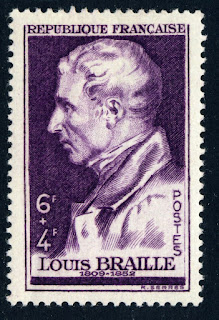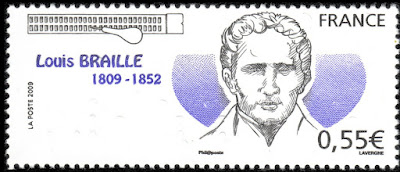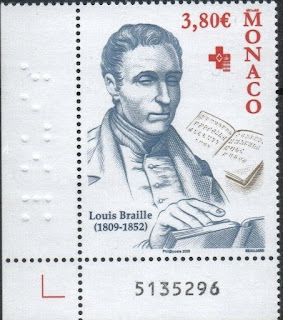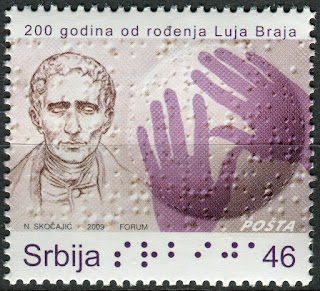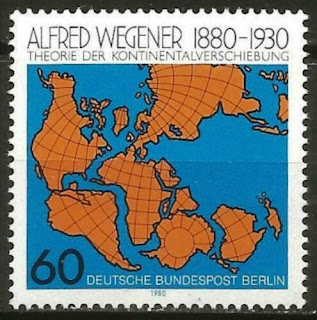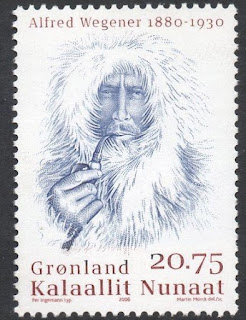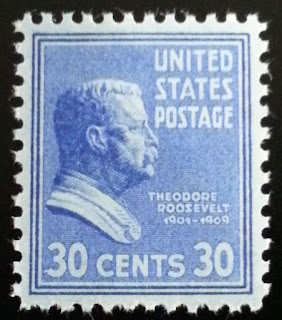1852 Died: Louis Braille, French educator, invented Braille (b. 1809)
Louis Braille (4 January 1809 – 6 January 1852) was a French educator and inventor of a system of reading and writing for use by the blind or visually impaired. His system remains virtually unchanged to this day, and is known worldwide simply as braille.
Blinded in both eyes as a result of an early childhood accident, Braille mastered his disability while still a boy. He excelled in his education and received a scholarship to France's Royal Institute for Blind Youth. While still a student there, he began developing a system of tactile code that could allow blind people to read and write quickly and efficiently. Inspired by the military cryptography of Charles Barbier, Braille constructed a new method built specifically for the needs of the blind. He presented his work to his peers for the first time in 1824.
In adulthood, Braille served as a professor at the Institute and had an avocation as a musician, but he largely spent the remainder of his life refining and extending his system. It went unused by most educators for many years after his death, but posterity has recognized braille as a revolutionary invention, and it has been adapted for use in languages worldwide.
Stamps from France, Monaco, East Germany, Vatican, Serbia and Montenegro depicting Louis Braille
Stamps from France, Monaco, East Germany, Vatican, Serbia and Montenegro depicting Louis Braille
1884 Died: Gregor Mendel, Czech geneticist and botanist (b. 1822)
Gregor Johann Mendel (Czech: Řehoř Jan Mendel; 20 July 1822 – 6 January 1884) was a scientist, Augustinian friar and abbot of St. Thomas' Abbey in Brno, Margraviate of Moravia. Mendel was born in a German-speaking family in the Silesian part of the Austrian Empire (today's Czech Republic) and gained posthumous recognition as the founder of the modern science of genetics. Though farmers had known for millennia that crossbreeding of animals and plants could favor certain desirable traits, Mendel's pea plant experiments conducted between 1856 and 1863 established many of the rules of heredity, now referred to as the laws of Mendelian inheritance.
Mendel worked with seven characteristics of pea plants: plant height, pod shape and color, seed shape and color, and flower position and color. Taking seed color as an example, Mendel showed that when a true-breeding yellow pea and a true-breeding green pea were cross-bred their offspring always produced yellow seeds. However, in the next generation, the green peas reappeared at a ratio of 1 green to 3 yellow. To explain this phenomenon, Mendel coined the terms "recessive" and "dominant" in reference to certain traits. (In the preceding example, the green trait, which seems to have vanished in the first filial generation, is recessive and the yellow is dominant.) He published his work in 1866, demonstrating the actions of invisible "factors"—now called genes—in predictably determining the traits of an organism.
The profound significance of Mendel's work was not recognized until the turn of the 20th century (more than three decades later) with the rediscovery of his laws. Erich von Tschermak, Hugo de Vries, Carl Correns and William Jasper Spillman independently verified several of Mendel's experimental findings, ushering in the modern age of genetics.
Stamps from Austria, Germany and the Vatican depicting Mendel
Stamps from Austria, Germany and the Vatican depicting Mendel
1912 – German geophysicist Alfred Wegener first presents his theory of continental drift.
Alfred Lothar Wegener (1 November 1880 – November 1930) was a German polar researcher, geophysicist and meteorologist.
During his lifetime he was primarily known for his achievements in meteorology and as a pioneer of polar research, but today he is most remembered as the originator of the theory of continental drift by hypothesizing in 1912 that the continents are slowly drifting around the Earth (German: Kontinentalverschiebung). His hypothesis was controversial and not widely accepted until the 1950s, when numerous discoveries such as palaeomagnetism provided strong support for continental drift, and thereby a substantial basis for today's model of plate tectonics. Wegener was involved in several expeditions to Greenland to study polar air circulation before the existence of the jet stream was accepted. Expedition participants made many meteorological observations and were the first to overwinter on the inland Greenland ice sheet and the first to bore ice cores on a moving Arctic glacier.
Stamps from Austria, Berlin and Greenland picturing Wegener
Stamps from Austria, Berlin and Greenland picturing Wegener
1919 Died: Theodore Roosevelt, American colonel and politician, 26th President of the United States (b. 1858)
Theodore Roosevelt Jr. (October 27, 1858 – January 6, 1919) was an American statesman, politician, conservationist, naturalist, and writer who served as the 26th president of the United States from 1901 to 1909. He served as the 25th vice president from March to September 1901 and as the 33rd governor of New York from 1899 to 1900. As a leader of the Republican Party, he became a driving force for the Progressive Era in the United States in the early 20th century. His face is depicted on Mount Rushmore alongside George Washington, Thomas Jefferson, and Abraham Lincoln. He is generally ranked in polls of historians and political scientists as one of the five best presidents.
Roosevelt was a sickly child with debilitating asthma, but he overcame his health problems by embracing a strenuous lifestyle, as well as growing out of his asthma naturally in his young adult years. He integrated his exuberant personality, vast range of interests, and world-famous achievements into a "cowboy" persona defined by robust masculinity. He was home-schooled, and he began a lifelong naturalist avocation before attending Harvard College. His book The Naval War of 1812 (1882) established his reputation as a learned historian and as a popular writer. Upon entering politics, he became the leader of the reform faction of Republicans in New York's state legislature. His wife and his mother both died in rapid succession, and he escaped to a cattle ranch in the Dakotas. He served as Assistant Secretary of the Navy under President William McKinley, but he resigned from that post to lead the Rough Riders during the Spanish–American War, returning a war hero. He was elected Governor of New York in 1898. Vice President Garret Hobart died, and the New York state party leadership convinced McKinley to accept Roosevelt as his running mate in the 1900 election. Roosevelt campaigned vigorously, and the McKinley-Roosevelt ticket won a landslide victory based on a platform of peace, prosperity, and conservation.
Roosevelt took office as vice president in March 1901 and assumed the presidency at age 42 after McKinley was assassinated the following September. He remains the youngest person to become President of the United States. Roosevelt was a leader of the Progressive movement, and he championed his "Square Deal" domestic policies, promising the average citizen fairness, breaking of trusts, regulation of railroads, and pure food and drugs. He made conservation a top priority and established many new national parks, forests, and monuments intended to preserve the nation's natural resources. In foreign policy, he focused on Central America where he began construction of the Panama Canal. He expanded the Navy and sent the Great White Fleet on a world tour to project the United States' naval power around the globe. His successful efforts to broker the end of the Russo-Japanese War won him the 1906 Nobel Peace Prize. He avoided controversial tariff and money issues. Roosevelt was elected to a full term in 1904 and continued to promote progressive policies, many of which were passed in Congress. He groomed his close friend William Howard Taft, and Taft won the 1908 presidential election to succeed him.
Roosevelt grew frustrated with Taft's conservatism and belatedly tried to win the 1912 Republican nomination. He failed, walked out, and founded the so-called "Bull Moose" Party which called for wide-ranging progressive reforms. He ran in the 1912 election and the split allowed the Democratic nominee Woodrow Wilson to win the election. Following the defeat, Roosevelt led a two-year expedition to the Amazon basin where he nearly died of tropical disease. During World War I, he criticized President Wilson for keeping the country out of the war with Germany, and his offer to lead volunteers to France was rejected. He considered running for president again in 1920, but his health continued to deteriorate and he died in 1919.
US stamps depicting Teddy Roosevelt
US stamps depicting Teddy Roosevelt
